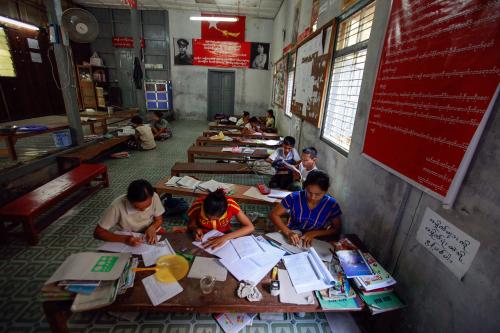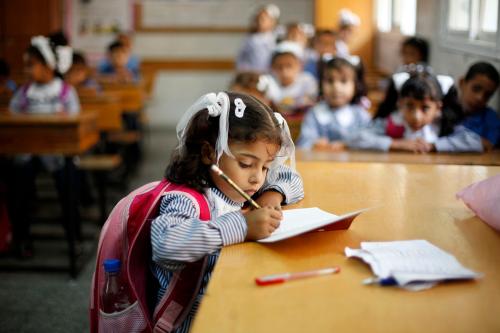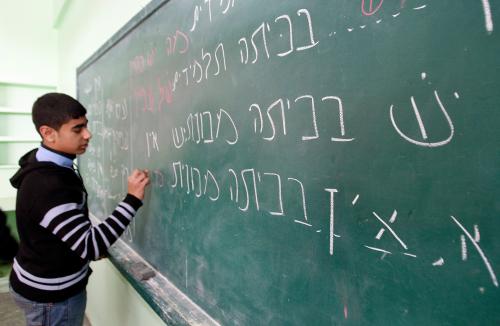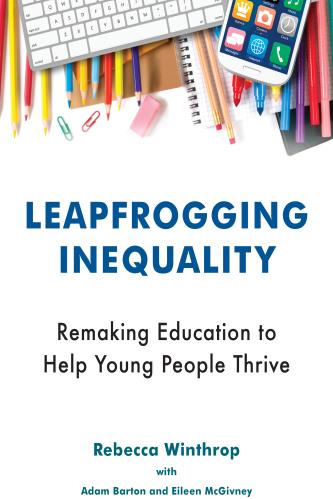This month will see the launch of two major reports on education processes that have been widely consulted over the past 18 months: Making Education a Priority in the Post-2015 Development Agenda: Report of the Global Thematic Consultation on Education in the Post-2015 Development Agenda and Toward Universal Learning: Recommendations from the Learning Metrics Task Force. The definitive list of education priorities for the post-2015 agenda within the first report is well complemented by the Learning Metrics Task Force report, which focuses on how to achieve and measure progress toward one of these key priorities: learning for all and associated learning outcomes.
Both reports highlight the narrow focus of Millennium Development Goal 2, which pushes for achieving greater access to education at the expense of education quality. This push inadvertently drew attention away from ensuring sufficient learning outcomes for children in developing countries. The report from the post-2015 global education consultation process states that a stronger commitment to good quality education, with a focus on learning, is perhaps the most important priority for a post-2015 education agenda. It highlights widespread consensus within the post-2015 education consultation process that learning should be at the heart of future goals, supported by clearly defined measures of learning achievement that incorporate equity and inclusion.
The Learning Metrics Task Force report summarizes the education community’s consensus on the competencies that are important for all children and youth to develop, the corresponding indicators to track global progress on education and learning, and the actions needed to improve the measurement of learning in all countries. The highly consultative process of the task force has helped to catalyze the shift in the global education community from promoting universal access to access plus learning. The collection of better data on learning is central to that effort, and the task force calls upon education systems to offer opportunities for children and youth to master competencies in seven domains of learning. The task force sees these domains as essential for preparing young people for their future lives. Education systems should focus on integrating these competencies into existing learning frameworks, starting with early childhood and extending through lower secondary school.
Critically, the task force has come to consensus on a small set of learning indicators that are both feasible and desirable for tracking progress in all countries (see box below). These indicators measure fundamental learning opportunities and outcomes over a child’s educational career. Some indicators within these areas of measurement currently exist, while others need to be developed. Countries will need to discuss, prioritize and take action to determine what they will measure in relation to their respective specific goals and needs.
![]()
The task force also calls for an explicit focus on equity to accompany the measurement of learning, with particular attention paid to rising inequality within countries. Measures of access and learning, along with data on child characteristics, should be used to ensure equitable learning opportunities (shaped by a range of factors such as school conditions, teacher quality, etc.) and to reduce disparities in learning outcomes. This requires an understanding of the characteristics of out-of-school children and youth and the barriers they face, as well as explicit efforts to identify those children who are furthest behind and strategies to accelerate their progress.
The task force calls for the international community to support countries in strengthening their assessment systems and, ultimately, in improving learning levels. It proposes that an international, multi-stakeholder partnership could ensure better collaboration among existing agencies, fill essential gaps to support countries, and help sustain a broad coalition of education and development stakeholders with a common vision of learning for all. The task force calls for assessment to be recognized as a public good, which benefits all children and youth because of the potential to use assessment data to improve learning conditions and learning outcomes. To this end, the report calls for assessment tools, documentation and data to be made freely available, as no country should be precluded from measuring learning outcomes due to financial constraints.
The task force’s final recommendation is a call to action for teachers, national governments, civil society groups, multilateral organizations, donors, assessment institutions, and the private sector to collectively ensure the right to learn for all children and youth. With these recommendations, the Learning Metrics Task Force sets forth an ambitious agenda for leveraging assessments to improve learning opportunities and outcomes for all children and youth. The task force itself is transitioning into a new stage of work, with a focus on mobilizing the technical, institutional and political capacity necessary to operationalize the recommendations and common goals for measuring learning.
As the post-2015 discussions on education begin to focus in on targets and indicators for tracking, as well as scaling up national capacity, the recommendations from the Learning Metrics Task Force should inform the debate that will ultimately be decided on by U.N. member countries. Moreover, as the task force’s work to support countries in diagnosing the quality of their assessment systems moves forward, the lessons learned will be valuable to decision-makers working on the post-2015 agenda, as well as officials in various national ministries of education preparing to make the paradigm shift to access plus learning. Ultimately, the goal of this work is to better enable policymakers to not only track how they are doing, but also to target policy changes that improve the learning experiences of all children and youth.
The Brookings Institution is committed to quality, independence, and impact.
We are supported by a diverse array of funders. In line with our values and policies, each Brookings publication represents the sole views of its author(s).










Commentary
Consensus on Learning as a Priority for Global Education Post-2015
September 17, 2013